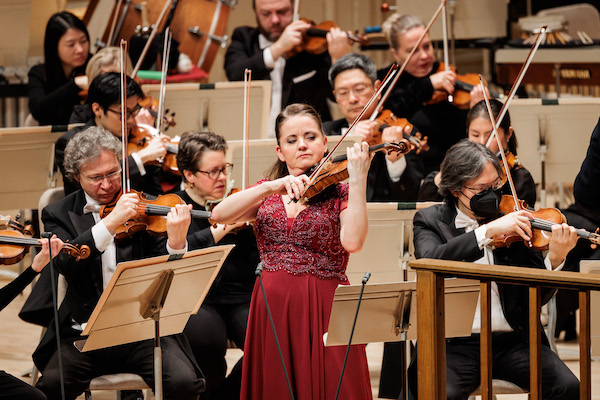Concert Review: Boston Symphony Orchestra Plays Shostakovich, Brahms, and Mackey
By Aaron Keebaugh
Under the baton of Andris Nelsons, a listless Boston Symphony Orchestra delivered flat renditions of works by Shostakovich and Brahms.

Guest violinist Baiba Skride performing Shostakovich’s Violin Concerto No. 2 with the Boston Symphony Orchestra. Photo: Aram Boghosian.
On paper, Thursday night’s Boston Symphony Orchestra concert promised to deliver seismic urgency.
But the program proved the old maxim that great music is better than most performances of it. Under the baton of Andris Nelsons, a listless Boston Symphony Orchestra delivered flat renditions of works by Shostakovich and Brahms.
Of course, a lack of energy makes sense when performing Shostakovich’s Violin Concerto No. 2, which quietly broods like the composer’s other late works. But this score from 1967 requires the performers to gradually build tension through nuanced nervous gestures that eventually erupt in plays of sardonic wit.
Thursday’s soloist was Baiba Skride, who took a puzzlingly understated and passive approach to this composition. Skride played with a delicate tone that didn’t probe the darkness so much as wade through. The piece’s drama wasn’t about a hero struggling against the larger forces — it was more like listening for a voice lost in the din. Too often the orchestra overpowered her dull delivery, which failed to draw out the music’s anxieties, let alone its angst.
Nelsons’ lingering tempos did little to rectify the lack of determination. While supplying sumptuous sound, the orchestra played with little sense of purpose — the enervated rendition felt more like a reading than a fully realized performance.
The conductor’s Technicolor approach usually discovers compelling surprises in large-scale canvases. But on Thursday he didn’t go for the wide lens, but looked at Brahms’s Symphony No. 4 through a perpetual close-up. The result was Brahms treated as a fragmented mosaic. Sure, there were intimate moments, beautifully sculpted phrases, and bursts of lyricism. But the various parts never cohered into a powerful, comprehensive picture.
Here too, Nelsons’ ponderous tempos robbed the music of its force. The opening movement and Andante felt prodding. In contrast, the Scherzo and concluding Passacaglia felt rushed because they were each taken at a quicker pace. Crucially missing — any sense of momentous psychological or spiritual struggle.
Happily, the BSO seized on an opportunity to stand back and look at the big celestial picture provided by Steven Mackey’s Concerto for Curved Space, which was a true delight in its world premiere. This BSO co-commission captures in sound the awe that Mackey experienced while viewing photographs of the cosmos.
Overall, the music glistens in a web of gossamer orchestration. Strings shimmer in their biting harmonies and wild glissandos. Woodwinds and brass lines also teem with vibrancy as they rhythmically overlap with the forceful snap of the percussion.
At 30 minutes, the music begins at times to feel a little too long and unwieldy — lines build to a stasis that just burns itself out. Still, the constantly shifting sonic shapes generally manage to keep listeners transfixed in the moment.
Nelsons highlighted each transformation with mesmerizing panache. Like gazing at clouds of stars in the night sky, the reward of Mackey’s score lies in the opportunity to be hypnotized by the sheer grandeur of the experience.
Aaron Keebaugh has been a classical music critic in Boston since 2012. His work has been featured in the Musical Times, Corymbus, Boston Classical Review, Early Music America, and BBC Radio 3. A musicologist, he teaches at North Shore Community College in both Danvers and Lynn.
Tagged: Andris Nelsons, Baiba Skride, Boston Symphony Orchestra

You nailed it. The Brahms was pedestrian, the Shostakovitch a big disappointment especially in terms of violin tone.
But Concerto for Curved Space was an exciting revelation of interesting harmony, rhythm and orchestration.
It did seem to me that Skride’s violin got lost in the high grass during the Shostakovich. In fairness, it is a strange piece, like a caged tiger (or a house cat) pacing back and forth in a cage, never roaring or breaking out.
I do wonder what is going on with the orchestra — are the players alienated by Nelsons? How is it possible that Gail Samuel quit after such a short time (replaced by the executive director of Sesame Street), and NOBODY seems to know why, or even to hazard a hypothesis? A reporter needs to tell the management, “We’re going to write a big story about this, and your not willing to be speak candidly about it is not going to stop us. We’ll talk to as many people as we can and come up with the best explanation we can.”
Where’s Richard Dyer when we need him Let me take a guess: she found Nelsons impossible to work with, if not on programming, which is his job, then on soloists, overall priorities or finances. Maybe she said, when Baiba Skride was signed up again, “Andris, we need the best of the world, not the best of your pals.”